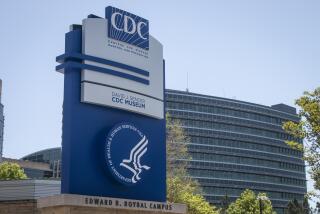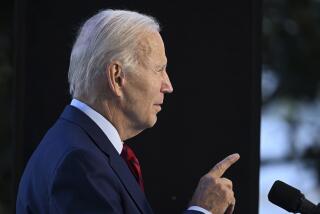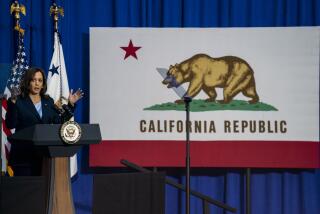The White House is a coronavirus hot spot. But no one can make it do contact tracing
- Share via
Contact tracing is the bedrock of disease outbreak containment, but experts said the White House has no legal obligation to investigate coronavirus infections that might have originated there.
At least 12 people have tested positive since attending a Sept. 26 White House ceremony to nominate Judge Amy Coney Barrett to the Supreme Court.
They were among more than 100 attendees who sat in tightly packed rows without masks. Videos show some greeting each other with hugs.
Experts worried that the collateral damage could extend to hundreds of people.
While attendees now know from news reports that they might have been exposed, many other people have since crossed paths with possibly infected White House staffers or guests — and may be unaware that they need tests.
The U.S. Centers for Disease Control and Prevention, which recommends contact tracing for all coronavirus outbreaks, has teams of experts who could carry it out for the White House.
The Trump administration, however, has relegated contact tracing to an internal team of doctors, who reportedly have focused on tracking down those in close proximity to the president between the Sept. 29 debate in Ohio and his positive test for the coronavirus two days later.
Because it appears that the virus was present at the Supreme Court nomination event three days before the debate, experts said disrupting the web of transmission also depends on tracking down the attendees and the people with whom they later crossed paths.
“It is standard to notify any contacts of known cases as quickly as possible,” said Dr. Tom Frieden, the former head of the CDC, who now serves as chief executive of the global health initiative Resolve to Save Lives.
Lawrence Gostin, a health law expert at Georgetown University, said there are no federal laws that compel a thorough investigation of the White House outbreak, but that there is an ethical responsibility to conduct one.
The president “has a sworn constitutional duty to protect the public, not cause it harm,” Gostin said. “The only way for him to do that is to unleash the CDC or the D.C. health department to intervene.”
District of Columbia authorities does not have jurisdiction on federal property, and because the CDC is part of the executive branch, the president has final say over its operations.
“The command goes one way: from the president to the CDC director, not vice versa,” said Gostin. “In any other state or jurisdiction, it would be pretty much unthinkable that no one would have the power to contact-trace. But President Trump is in a lawless position.”
Dr. Marcus Plescia, chief medical officer at the Assn. of State and Territorial Health Officials, said involving the CDC is not essential.
“It would be reasonable for the White House to choose to do it themselves,” he said. “But someone should be doing it.”
The White House and the CDC did not immediately respond to messages seeking comments.
Contact tracing, a long-hailed process of mitigating communicable disease, involves a speedy, systematic process of reaching out to everyone who is known to have been in the orbit of an infectious person and asking them to test and self-quarantine while they await results.
Contact tracers also ask the exposed people for their own list of contacts in order to get a jump-start on tracking down the next ring of possible cases.
“Contact tracing might just be the least invasive, least liberty-limiting, and most important public health intervention we have available to us,” said Nicholas Evans, a bioethicist at the University of Massachusetts Lowell.
The lack of vigor in the White House’s efforts are “a derogation of their responsibility as public servants,” he said, contrasting federal inaction with successful use of contact tracing in New Zealand, Taiwan and elsewhere.
The White House has declined to report how many staff members have tested positive, though close to 20 people in the president’s sphere have gone public with their own diagnoses. The numbers continue to grow.
Critics of the Trump administration say it is shirking its ethical mandate in order to obscure the number of cases that link back to the president and his contacts.
They also say the White House is averse to contact tracing because it is not eager to reveal who has visited the White House — information that past administrations had made public.
More to Read
Get the L.A. Times Politics newsletter
Deeply reported insights into legislation, politics and policy from Sacramento, Washington and beyond. In your inbox twice per week.
You may occasionally receive promotional content from the Los Angeles Times.











